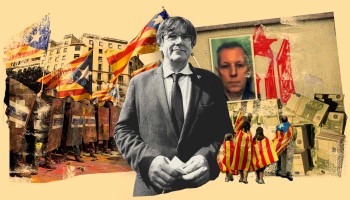Col. Alexander Astafyev, 50, had been researching a paper on “raiding” – criminal takeovers of businesses involving corrupt judges, police and officials – for George Mason University (GMU), based in a Washington, D.C. suburb, when he was arrested.
Authorities in Vladivostok, where Astafyev had been working with a GMU research center, charged that he illegally accepted three air conditioners and a computer from the regional witness protection program that Astafyev directed.
Astafyev told the interior minister in a letter that he’d been framed by police and state security officials with ties to a criminal group he’d been investigating, and indicated that he feared he’d be killed in prison to prevent him from implicating others.
Report Named Names
Astafyev also suggested that his research may have landed him in prison. He’d submitted his draft paper to GMU’s Terrorism, Transnational Crime and Corruption Center shortly before his June 16 arrest. The paper discusses cases of criminal business raiding in Vladivostok, including one group involved in smuggling and murder – the same group he believes framed him. Astafyev linked the group to police and security officials, as well as to two local officials, all named in the paper.
Observers believe that the charges were trumped up to discredit Astafyev’s research or to silence him altogether, as Astafyev had become known for integrity and honesty in the 33 years he served as a policeman. “If such a person will be imprisoned now, that means corruption has totally won in Russia,” Vladivostok newspaper editor Maria Solovienko told the Post.
Louise Shelley, who heads the GMU crime research center that had awarded Astafyev a $3,000 research grant, called the arrest “disturbing.”
Astafyev was a respected figure in the field; last year the US State Department invited him to Washington, where he worked closely with FBI agents investigating organized crime.
-- Beth Kampschror
Cybercrime tops security threats list
By the time this is posted, the end-of-the-year top ten list mania, thankfully, will be over. Among the tedious roundups of...





